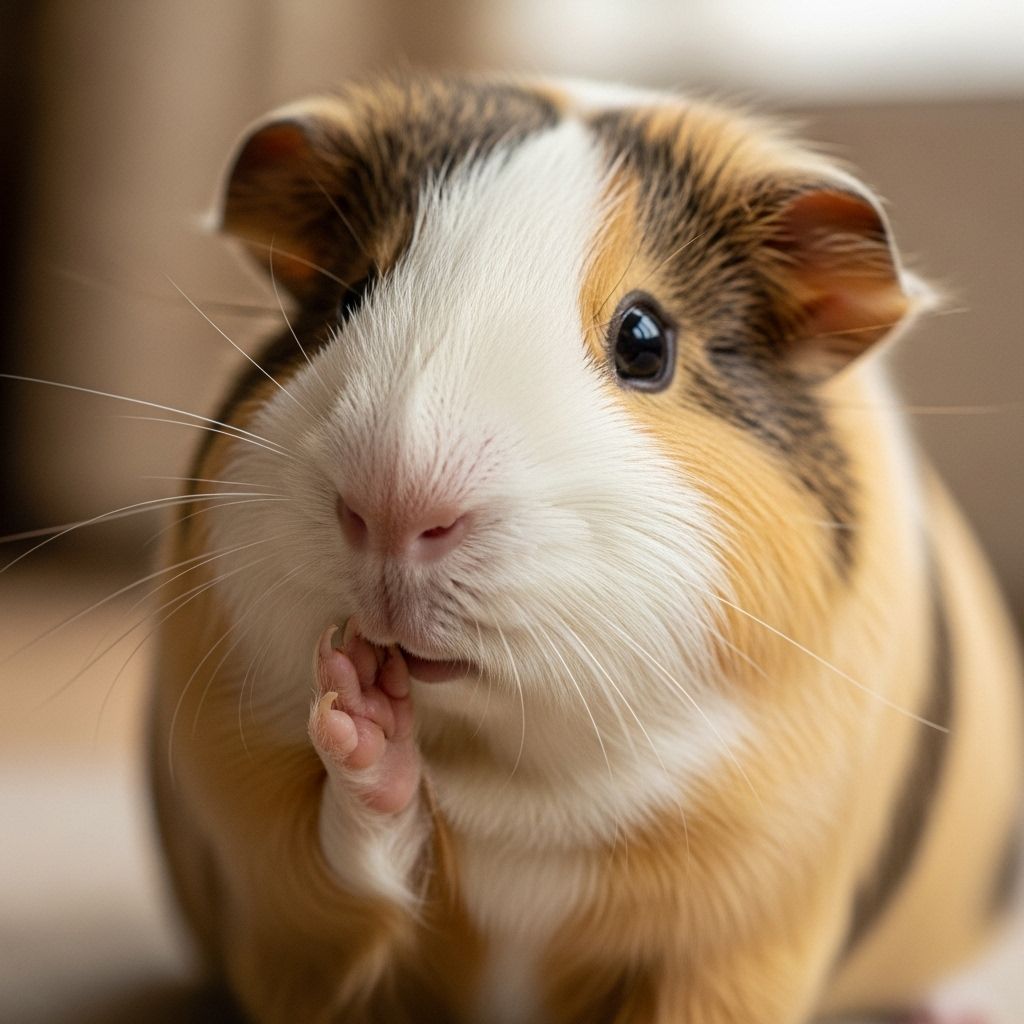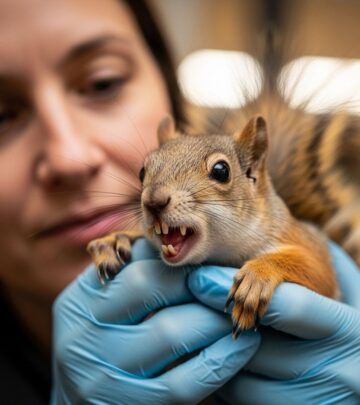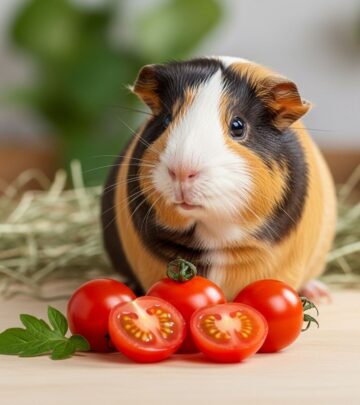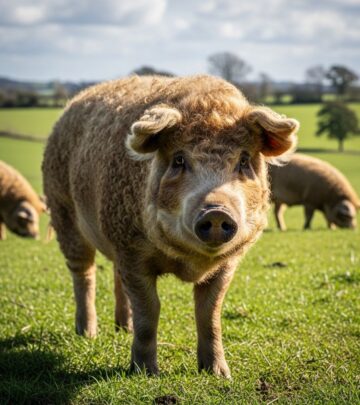Do Guinea Pigs Bite? Understanding Their Behavior and Ensuring Safe Interaction
Understanding subtle signals helps you respond compassionately and strengthen your bond.

Do Guinea Pigs Bite? Understanding Their Gentle Nature
Guinea pigs are well-loved for their docile, friendly personalities and make wonderful companions for both children and adults. Still, many prospective owners or those new to small animal care often ask: Do guinea pigs bite? It is a reasonable concern, especially for families with young children. This article explores why guinea pigs might bite, how to interpret their behavior, and effective strategies to foster a safe and happy relationship with your furry friend.
Are Guinea Pigs Aggressive Biters?
Unlike some small pets, guinea pigs are not inherently aggressive or prone to biting their handlers. Their first instinct is usually to communicate discomfort or curiosity through gentle nibbles or mouthing, which rarely break the skin and generally do not hurt.
- Guinea pigs mostly give exploratory nibbles, not true bites.
- Biting hard enough to hurt or draw blood is rare and usually indicates a serious reason.
- They use their teeth aggressively only when threatened, cornered, or in pain.
Types of Guinea Pig ‘Bites’
It is important to distinguish between the types of bites or nibbles you might experience:
- Exploratory Nibbles: These are soft mouthings while being held, often mistaken for biting but simply a way of exploring their environment.
- Warning Nips: Slightly firmer and meant to signal discomfort or a wish to be put down.
- True Bites: These occur rarely, are usually hard enough to hurt, and have a clear cause such as fear, pain, or a perceived threat.
Most guinea pigs are far more likely to express displeasure by chirping, whining, or running away than by biting.
Common Reasons Why Guinea Pigs Might Nip or Bite
Since guinea pigs are typically gentle, a real bite means your pet is trying to tell you something important. Understanding the underlying causes helps prevent future issues and strengthens your bond.
1. Fear or Feeling Threatened
- Sudden movements, loud noises, or rough handling can prompt a defensive bite.
- New guinea pigs, or those not used to people, may nip if frightened.
2. Pain or Illness
- Injuries or health issues can make your guinea pig more sensitive, leading to a bite if you unknowingly touch a sore spot.
3. Hunger or Needing Attention
- A hungry guinea pig may nip at fingers, especially if your hands smell like food.
- Cage-biting often signals a request for attention, food, or fresh water.
4. Wanting to Go Back to Their Cage
- Some guinea pigs nip gently to indicate they are tired of being held or want to return to their enclosure.
5. Overstimulation or Improper Handling
- Holding a guinea pig for too long, lack of body support, or accidental petting “against the fur” can lead to nips.
6. Scent or Taste
- If your hands have food residue or a strange smell, guinea pigs may nip or “test bite” out of curiosity.
7. Social Dynamics
- Guinea pigs may bite each other if they are fighting, stressed, or establishing hierarchy, and a person can get bitten when attempting to break up a scuffle.
Guinea Pig Cage Biting: What Does It Mean?
Biting or chewing on cage bars isn’t a sign of aggression towards people but usually an attempt to communicate specific needs or discomforts:
- Hunger: Guinea pigs have fast metabolisms and may bite bars to demand food, especially if meal time is late.
- Boredom or Loneliness: Lack of stimulation, toys, or companionship can prompt repetitive cage-biting behavior.
- Cramped or Dirty Environment: Insufficient space or soiled bedding can drive your guinea pig to chew bars out of frustration or a desire to call attention to the problem.
- Desire for Attention: Some guinea pigs bite the cage to signal they want interaction, out-of-cage time, or cuddles.
What to Do If Your Guinea Pig Bites
Reacting calmly and thoughtfully is the best way to address biting:
- Don’t punish or hit your guinea pig. Physical correction does not work and undermines trust.
- Identify the cause: Look for triggers such as illness, improper handling, hunger, or an unfamiliar environment.
- Adjust your approach: Use gentle, confident movements, and offer treats or soothing words to build positive associations.
- If pain or health issues are suspected, consult a vet promptly.
With patience and kindness, most guinea pigs outgrow nipping behaviors as they acclimate to their human companions and surroundings.
How to Prevent Guinea Pig Biting
Proactive care and consistent, gentle handling can virtually eliminate biting incidents:
- Always wash your hands before and after handling to remove tempting food odors.
- Support your guinea pig’s entire body when lifting.
- Respect their preferences — some dislike being petted on their rump or tummy.
- Provide a steady diet of fresh food, hay, and clean water to avoid food-related frustration.
- Supply cage mates for company, plenty of enrichment toys, and regular playtime outside the cage to curb boredom.
- Allow time for guinea pigs to adjust to new sights, sounds, and people.
- Be patient with new or shy guinea pigs, letting them come to you and rewarding gentle behavior with treats.
Creating a Bite-Free Bond: Socializing Tips
Developing trust is key to enjoying a wonderful relationship with your guinea pig:
- Let guinea pigs sniff your hand before attempting to pick them up.
- Sit with them on the floor, offering leafy greens or treats so they associate you with positive experiences.
- Observe their body language; signs they want to be left alone include teeth chattering, whining, or attempts to run away.
- Engage in short, calm interactions until your pet becomes more confident.
- Never force attention; let your guinea pig choose when to interact, especially initially.
When to Consult a Veterinarian
If your guinea pig suddenly begins to bite more often, or with apparent pain, it may be time to consult a veterinary professional:
- Biting combined with squealing, limping, or changes in appetite might signal illness or injury.
- Sudden aggression from a previously calm guinea pig could reflect an underlying medical concern.
- Healthcare professionals can recommend the right training or treatment if behavioral issues persist.
Frequently Asked Questions (FAQs)
Do guinea pigs bite hard enough to break skin?
It is extremely rare. Most nibbles are harmless. Only when very scared, pained, or threatened can a bite break the skin.
Why is my guinea pig biting the bars of its cage so much?
This commonly signals boredom, hunger, or a need for more enrichment. Double-check their food, cage cleanliness, and try providing new toys or a larger space.
How can I teach my guinea pig not to bite?
Focus on gentle handling, respect their boundaries, and never reinforce biting by responding with fear or anger. Calm, consistent interactions and positive reinforcement work best.
Are guinea pigs safe pets for children?
Absolutely. With proper supervision and handling, guinea pigs make safe, gentle companions for families—biting is extremely rare when their needs are met.
What should I do if my guinea pig bites me?
Stay calm, safely place them back in their cage, and try to identify any triggers (pain, fear, hunger, or improper handling). Once calm, gently rebuild trust through soothing words and treats.
Table: Most Common Guinea Pig Biting Triggers and Solutions
| Trigger | What It Means | What to Do |
|---|---|---|
| Sudden Bite During Handling | Fear, feeling unsupported | Pick up gently, support full body, speak softly |
| Biting After a While Out of Cage | Wants to go back, needs to urinate | Return to cage, keep sessions short at first |
| Cage Bar Biting | Hunger, boredom | Provide food, enrichment, clean environment |
| Test Nips When You Have Food-Smelling Hands | Curiosity, smells food | Wash hands before/after handling |
| Biting When Touched in Sensitive Areas | Dislikes being touched there, pain | Avoid those areas, see a vet if persistent |
Quick Tips for Guinea Pig Owners
- Always approach calmly to avoid startling your pet.
- Make handling sessions short and enjoyable, especially at first.
- Use treats to reward positive, gentle interaction.
- Observe their body language for early signs of discomfort.
- Maintain a consistent feeding and cleaning routine.
More Questions About Guinea Pig Biting
Q: Will my guinea pig stop biting once it gets used to me?
A: Most guinea pigs stop nipping as they become more comfortable and learn to trust their owner. Consistent, gentle interaction and positive reinforcement help speed up this process.
Q: Should I separate my guineas if they start biting each other?
A: If fighting is frequent or results in injury, temporarily separate them and reintroduce slowly, considering changes to their environment or consulting a veterinarian for guidance.
Q: Is biting ever a sign of a serious behavioral problem?
A: Rarely. Usually, biting is a communication of unmet needs or discomfort. Persistent, aggressive biting may need professional evaluation.
Conclusion
Guinea pigs are remarkably gentle pets who rarely bite out of malice. Instead, biting or nipping is most often a form of communication, signaling discomfort, fear, or a need that requires your attention. By understanding their signals, providing a stable and enriching environment, and handling them with care, you can all but eliminate any biting issues and ensure a trusting, affectionate relationship with your small pet.
References
- https://littlecavylove.wordpress.com/2020/09/01/do-guinea-pigs-bite/
- https://www.omlet.us/guide/guinea_pigs/training_your_guinea_pigs/not_biting/
- https://www.kaytee.com/learn-care/small-animals/do-guinea-pigs-bite
- https://luftpets.com/blogs/news/guinea-pig-biting-cage
- https://www.youtube.com/watch?v=v5FNj7xOl3k
Read full bio of Shinta












